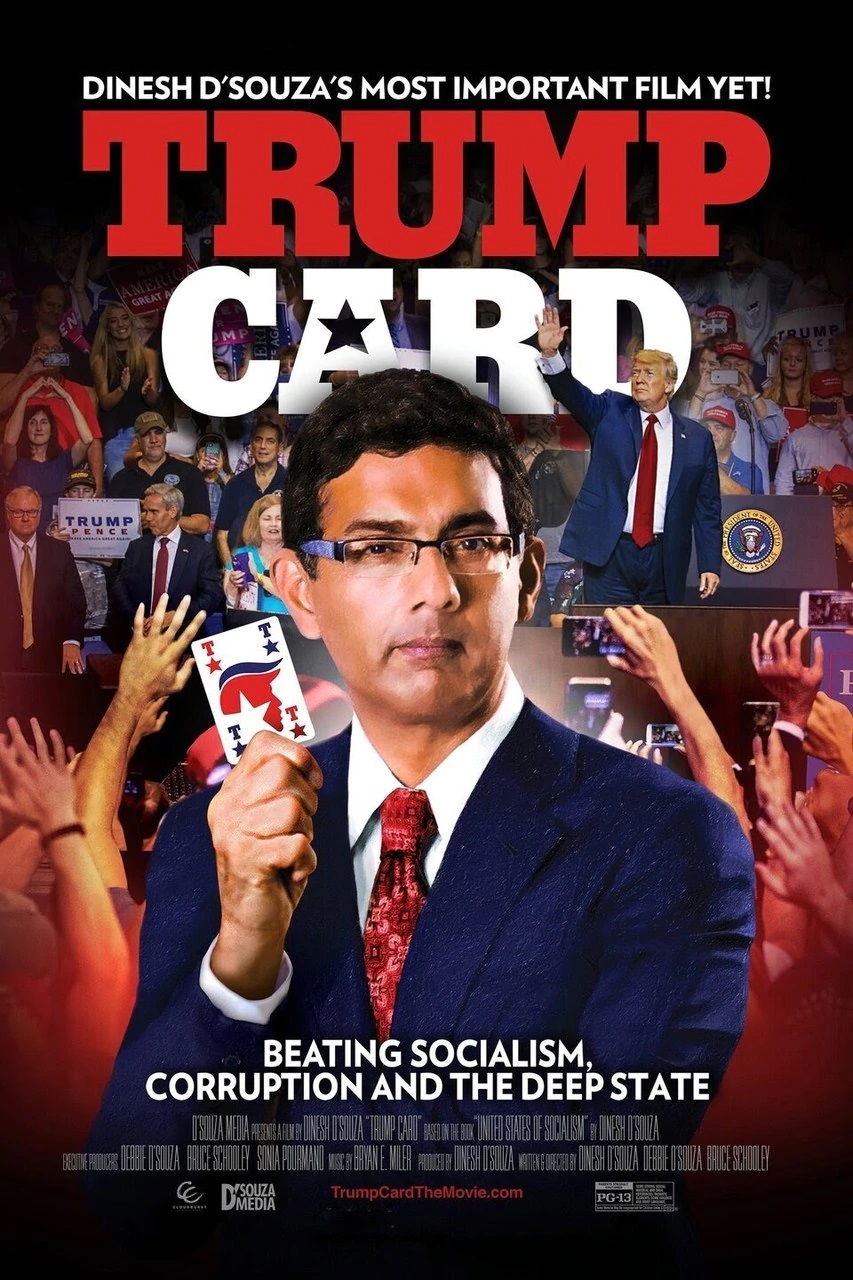Trump Card
For a documentary called Trump Card, it's surprising how little Donald Trump figures into things. Instead, Dinesh D'Souza's new film – co-directed with his wife Debbie and Bruce Schooley, and based on his book United States of Socialism – attempts to make the argument that Democrats want to turn America into a Socialist nation. This is a fear expressed by many Conservatives, so there's potentially a thought-provoking picture to be made about it. D'Souza is merely preaching to the choir, though. Any possibility of convincing moderate or liberal viewers is pretty much zero, thanks to unreliable commentators and manipulation of basic facts.
The movie's thesis is that Democrats are using a variety of techniques to push our country closer and closer to the kind of Socialist state that didn't turn out so well for others. They are, he asserts, doing this through gender politics, destroying capitalism, and, of course, “fake news,” among other things. The villains here are people like Alexandria Ocasio-Cortez and Ilhan Omar, the latter of whom he criticizes for a 2019 legal finding that she violated campaign finance rules. (In other words, the same thing D'Souza himself served eight months in a community confinement center for.)
Actually, Omar provides a great example of how Trump Card goes off the rails. Like any politician, her political views can certainly be criticized or rebutted. D'Souza doesn't do that. He goes personal, interviewing people like international businessman Alan Bender, who claims, without evidence, that Omar is controlled by Qataris “through her weakness – money and sex.” (Bender is well-known for his unsubstantiated conspiracy theories about Omar, Jamal Khashoggi, and Jared Kushner.) A few minutes later, he gives screen time to Imam Mohammad Tawhidi, a fringe cleric with no mosque, who dubs her “ISIS with lipstick." No attempt is made to thoughtfully rebut the ideas Omar has put forward.
That kind of thing is an ongoing problem with the film. So is the credibility of the individuals D'Souza presents as experts on the Left's alleged push toward Socialism. Among them, his own wife and daughter, the latter of whom, we are told, has a book coming out soon. (That presumably explains her appearance.) Also popping up are Grey's Anatomy actor Isaiah Washington and social media personality Andy Ngo. Could the filmmaker find no more erudite or scholarly people to comment? Were no political science experts or esteemed professors available? Surely some exist who could advance the Conservative theory at the movie's center.
Perhaps worst of all is the section on media bias. Here, D'Souza ventures to a strip club to talk with Larry Sinclair, a man who claims to have smoked crack with and performed oral sex on Barack Obama. Sinclair, who has a 27-year criminal record, repeats those claims and more onscreen. The point Trump Card is getting to is that the media focused far more on the Conservative sex scandal – the Donald Trump/Stormy Daniels affair – than the Liberal one. Obviously, the difference is that we know for a fact Trump paid Daniels for her silence. Sinclair's allegations against Obama have nothing to substantiate them.
Such cherry-picking and selective presentation of facts is par for the course in this sort of unapologetically partisan documentary. Michael Moore, whom D'Souza somewhat hypocritically bashes for such an approach, does the exact same thing. In the end, the ultimate test is whether or not the central argument being made is presented in a convincing manner. D'Souza fails on that fundamental count. Without plausible interviewees and cohesive arguments, the whole thing falls flat. Trump Card merely throws out a lot of wild, easily seen-through allegations, then ends with the proclamation that only Trump can save America.
The opportunity for a smart, well-reasoned Conservative documentary is consequently wasted.
out of four
Trump Card is rated PG-13 for some strong sexual material and drug references, thematic elements, some violence and brief language. The running time is 1 hour and 42 minutes.
